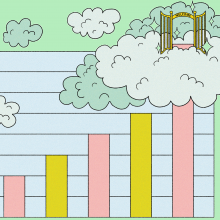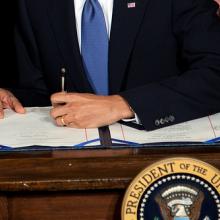finances
AS WE APPROACH the new year, the more fortunate among us will be taking time to organize their lives by rebalancing their financial portfolios and considering new investments. While taking care of your cash, it’s important to remember that a wise teacher once said, “Store up for yourselves treasures in heaven, where moths and vermin do not destroy.” I still don’t know what vermin is (it’s probably bad because it’s in the same sentence as moths), but I think the teacher might have been telling us that in additionto tending to our finances, we should also tend to our spiritual portfolios.
If you’re wondering about how exactly to do this, here are three rules to spiritual wealth that I think will prove helpful.
Large churches in the South tend to pay their senior pastors the highest salaries, a new survey finds.
That’s one of the conclusions on churches and finances released Sept. 9 by Leadership Network, a Dallas-based church think tank, and the Vanderbloemen Search Group, a Houston-based executive search firm for churches and ministries. A total of 727 North American churches with attendance ranging from 1,000 to more than 30,000 answered questions, more than double the number of congregations featured in previous studies.
The survey found that 14 percent of large churches have a financial bonus structure for their top leader. And one in five of the big congregations find ways to collect their money other than passing the proverbial offering plate.
An effort to tweak President Obama’s health care reform bill to fill a gap for church health insurance plans could fail because of Republicans’ insistence on repealing the law.
Without a fix, United Methodist Church leaders say some of their churches could drop current coverage for employees once “Obamacare” takes full effect next year, according to Colette Nies, spokeswoman for the UMC’s General Board of Pension and Health Benefits.
Under Obama’s 2010 Affordable Care Act, more than 50 percent of UMC clergy would qualify for tax credits available to lower- and middle-class families to purchase insurance. But because of the way the law was written, those tax credits cannot be used toward insurance plans churches can offer through government-run exchanges.
As has happened many times after I have given a talk about the Body of Christ’s responsibility to care for their brothers and sisters experiencing impoverished and dehumanizing conditions, I was asked to answerthose questions — the ones in my experience that are always the first to be asked the moment I stop speaking.
“How will I know I have given enough? How does the church balance financial responsibility with service to the poor? Where do we draw the line?”
These questions always come, sometimes spoken in a curious tone by a person whose heart is being convicted, sometimes in an angry accusing tone insinuating I must hate prosperity, sometimes privately as a whisper in my ear or in a personal email filled with insinuations about my sanity. What a preposterous proposal, that the Body of Christ in any particular location should be the first resource to its own community for spiritual, physical, and emotional well being! Don’t I know that such a mission is naïve and impossible to achieve? Most recently it was phrased like this: “I love this idea, but it is difficult to see benevolence funds go towards someone's electric bill when they smell like they smoked five packs of cigs before meeting with us; what do we do?”
The human community exists in perpetual motion; migration is a constant feature of our local and global reality. According to the International Organization for Migration, the total of international migrants increased from an estimated 150 million in 2000 to about 214 million in 2010, and the number of internal migrants (those who move within the borders of a given country) is about 750 million. These relocations are often related to the harsh consequences of war, environmental destruction, and economic downturn. As a result, those engaged in migration often do so for the sake of safety and opportunity, yet these potential rewards are sought in spite of deep personal and financial risk.
While the rates appear to be on the rise, the phenomenon as a whole is by no means exclusive to the present. The New Testament passage often known as “The Parable of the Prodigal Son” includes some of the harsh realities that are often associated with migration. One can examine this well-known parable through the lenses of migration, and in doing so, we are given insights in how to more faithfully extend hospitality to such strangers.
As Luke’s Gospel (15:11-32) reminds us, the youngest of two sons asked for an early inheritance from his father, received it, and then traveled to a “distant country” where he “… squandered his property in dissolute living.” As the term “dissolute” typically intends to describe degenerate and/or sinful behavior, we often conclude that the youngest son was deeply immersed in immorality, thus we find it difficult to feel sympathy when he later falls into the depths of poverty. We tend to perceive the prodigal son as someone who got what he deserved, for as the parable seems to illustrate, not only did he waste the inheritance received from his father, but he did so through sinful choices that brought deep dishonor to his family.
The Mormon church is lashing back at a business magazine that parodied their prophet’s mission and portrayed the church as lucratively rich but miserly with charitable donations.
A lengthy story in Bloomberg Businessweek that hits newsstands on Friday details The Church of Jesus Christ of Latter-day Saints’ vast financial holdings, from a $2 billion mall in Salt Lake City to a $1 billion ranch in Florida.
Reaction to the magazine’s cover has overshadowed the article, however. The illustration satirizes the moment when Mormons believe John the Baptist bestowed the priesthood on Joseph Smith, the faith's founding prophet.
In the parody, John the Baptist tells Smith, “and thou shalt build a shopping mall, own stock in Burger King, and open a Polynesian theme park in Hawaii that shall be largely exempt from the frustrations of tax ...” Smith answers, “Hallelujah.”
LDS church spokesman Michael Purdy said the magazine cover is “in such poor taste it is difficult to even find the words to comment on it.”
When it comes to financial advice in these tough economic times, more Americans today would rather take advice from business mogul Donald Trump than from the Bible.
According to a survey conducted in February by two biblically oriented nonprofits, 50 percent of Americans would choose Donald Trump as their financial adviser, despite his history of filing for bankruptcy, and only 32 percent look to the Bible.
"The Bible offers sound advice about managing money, avoiding debt and prospering in difficult times," said Lamar Vest, president of the American Bible Society, co-sponsor of the survey, but 94 percent of Americans are unable to pinpoint the verse from Proverbs about these themes.






